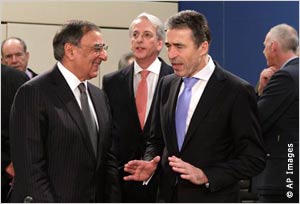Panetta Describes U.S. Military Transition in Afghanistan
Panetta Describes U.S. Military Transition in Afghanistan
02 February 2012

Defense Secretary Leon Panetta, left, speaks with NATO Secretary-General Anders Fogh Rasmussen during a meeting of NATO defense ministers at NATO headquarters on February 2.
Defense Secretary Leon Panetta says the United States is aiming to draw down combat forces from Afghanistan starting this year and end its combat role by late 2013, with a measured transition throughout 2014 to one of training and advising local security forces.
“As the president has said, we’re committed to an enduring presence” in Afghanistan, where U.S. military and civilians will continue to assist with transition and development, he said. Panetta spoke with reporters February 1 en route to Brussels for the annual NATO defense ministers meeting.
Afghanistan and the NATO security mission there are expected to be central topics during the defense ministers’ meetings in Brussels, February 2–3. Panetta will travel to Germany for the 48th annual Munich Security Conference February 3–5, where he will be joined by Secretary of State Hillary Rodham Clinton.
“We’ll be involved with training, advising and assisting, not only the Afghan forces, but we’ll continue to have to provide enabling forces for ISAF [International Security Assistance Force] as well as Afghanistan,” he added.
The transition to Afghan control of security operations is part of a strategy that was developed during the 2010 Lisbon NATO Summit, Panetta said. “That’s what the hope was … we could reach a point in the latter part of 2013 that we could make the same kind of transition we made in Iraq, from a combat role to a train-and-assist role,” he said.
And that does not mean U.S. and NATO forces will not be combat ready, because they will be, he added.
“We are going to be largely transitioning to a support role for the Afghan army as they take over these different areas in the future,” Panetta said.
While the U.S. military will draw down its forces, there will continue to be a significant diplomatic and development presence across the country, spearheaded by the U.S. State Department and the U.S. Agency for International Development. Under current plans, the Pentagon will draw down U.S. combat troops in Afghanistan to approximately 68,000 by the end of 2012.
Panetta said that 2014 becomes a year of consolidating the transition and making sure that those gains hold so that the United States can move toward an enduring presence after 2014. An essential key to Afghanistan’s security is the Afghan National Security Force and whether it has the assets to be a sufficient and sustainable force for the future, which will be at the center of talks in Brussels, he added.
“Without question, there has been significant improvement in the security situation on the ground” in Afghanistan, he told reporters. “The Taliban has not been able to regain any of the lost territory. They haven’t conducted a successful operation to regain territory.”
U.S. and allied forces have continued to weaken the Taliban insurgents, Panetta said. “And in addition to that, everyone says that the Afghan army is much more effective at engaging in operations,” he added.